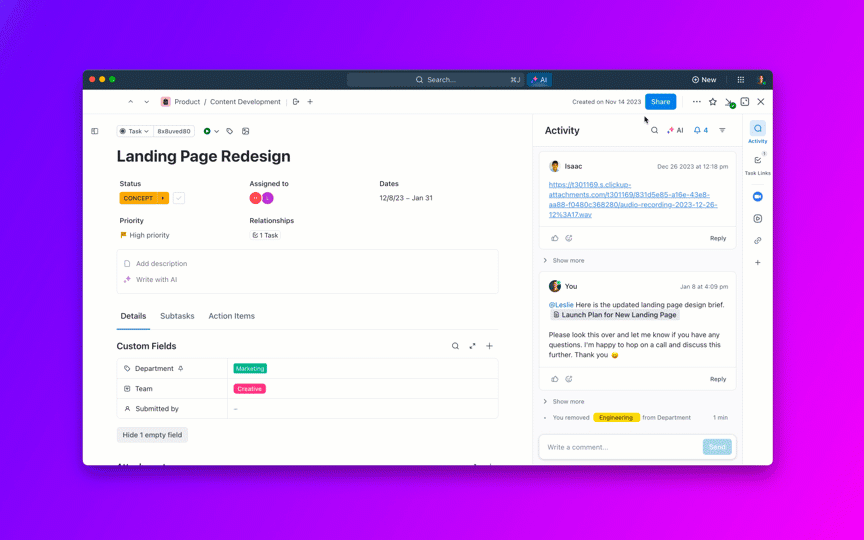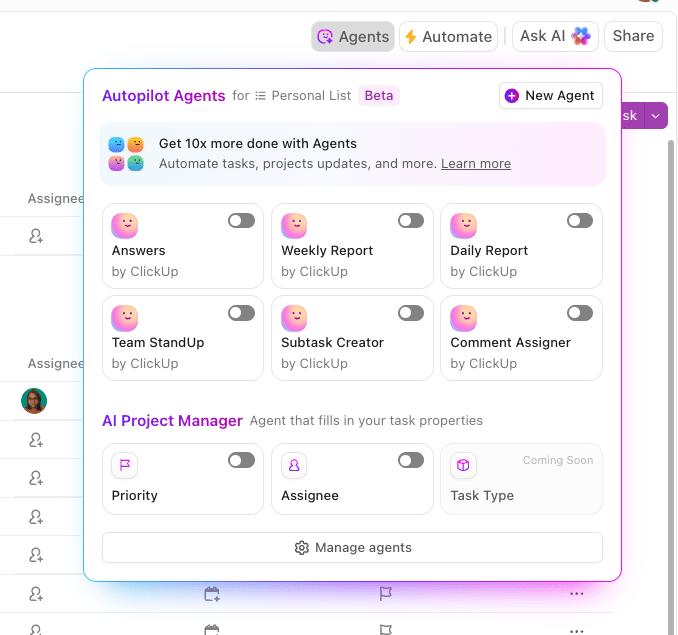How to Stop Thinking About Work All the Time?

Sorry, there were no results found for “”
Sorry, there were no results found for “”
Sorry, there were no results found for “”

Does your work follow you long after you’ve logged off?
Do you find yourself sitting down for a family dinner, and instead of being present, you’re consumed with thoughts of a spreadsheet formatting error that may or may not have messed up your data?
For many, the question of how to stop thinking about work isn’t just an idle concern—it’s a daily struggle. Work-related thoughts sneak into social activities, disrupt sleep, and make personal time feel like an extension of the office.
From creating mental boundaries to using productivity tools that simplify your day, let’s explore some actionable tips to regain control of your time and energy.
Struggling with overthinking work even well after office hours? Here’s how to regain control, reduce stress, and reclaim your personal time:
How often do you truly step away from work? By that, we mean not just physically leaving your desk, but mentally closing the door on work-related thoughts.
For many busy professionals, the answer is ‘rarely’. The mental load spills over into personal time, creating a cycle of stress and exhaustion. Disconnecting isn’t just about finding balance; it’s about reclaiming your time and mental energy.
Here’s why it matters:
The reality is simple: disconnecting from work restores your mental health and enhances your productivity. When you create distance between your work and other activities, you’re not escaping responsibilities. Quite the opposite, in fact. You’re creating the mental clarity you need to protect your mental and physical health and perform at your best.
Work overthinking is often a hidden side effect of modern workplace dynamics. Stressors like unclear expectations, perfection-driven environments, and constant connectivity can quietly take over your mental space, leaving you mentally exhausted even outside your work hours.
The impact of work isn’t confined to the workplace; it often extends into your personal life, disrupting your time and peace.
Unclear expectations are one of the most common drivers of overthinking. When tasks come with vague instructions or shifting deadlines, your mind naturally tries to fill in the gaps.
The result of unclear expectations? Hours of over-analysis, even during your free time, as you replay conversations or worry about getting it “right”
This mental strain intensifies when feedback loops are inconsistent. Without clarity on what’s working or what needs improvement, you’re left in a guessing game that can feel impossible to escape.
If you find yourself logged in and answering questions at midnight, you need to build an AI answer agent ASAP. Here’s why! 👇🏼
Technology has made it easier to work anywhere, but it’s also made it harder to stop. A single notification, whether during dinner or just before bed, can pull you back into work mode. Over time, these interruptions create a constant state of low-level stress that keeps your brain on high alert.
Remember, unless it’s a true emergency, you do not need to respond to a notification received outside of working hours at that very moment. The expectation of being “always available” blurs boundaries, making it difficult to truly relax or prioritize your mental health.
In many workplaces, the fear of making mistakes overshadows the value of creativity and innovation. A single critical comment or overly strict evaluation can push you into a cycle of overthinking every detail, from emails to presentations. This makes it hard to make decisions, move fast, and make real progress.
And often, this lure of perfection is not just a workplace issue; it spills over into your personal time too.
👀Did You Know? The Journal of Rational-Emotive and Cognitive-Behaviour Therapy says that perfectionism is closely tied to rumination, draining mental energy and preventing you from fully disconnecting
Your physical and emotional workspace plays a huge role in shaping your mental patterns. Open-plan offices, for instance, often encourage multitasking and interruptions, keeping your brain in reactive mode all day.
For remote workers, the challenge is different. Without in-person feedback, it’s easy to overanalyze every email or message, creating a cycle of doubt and second-guessing. And in toxic workplace cultures, where support is lacking and criticism is common, even minor decisions can feel overwhelmingly significant.
The root cause of work overthinking lies in rigid systems and habits that amplify stress. By identifying these triggers and making small, intentional changes, you can start reclaiming your time, energy, and focus for what truly matters.
Breaking free from work-related thoughts can feel challenging, especially when your brain is trained to stay in “work mode.” However, with intentional changes and a focus on mental clarity, it’s possible to reclaim your personal time.
Here’s how:
Your brain thrives on boundaries. Setting specific work hours helps you manage your time effectively while allowing yourself the freedom to disconnect.
Consistency is key. When your mind knows when work stops, it becomes easier to shift gears and focus on your personal life.
💡Pro Tip: Utilize ClickUp Time Management to create efficient work and downtime schedules
Mindfulness is a scientifically proven way to manage stress and anxious thoughts. By focusing on the present, you can redirect your mind away from work concerns and into a calmer state.
Even small moments of mindfulness can make a big difference in reducing stress levels and improving your mental health.
Your brain loves variety. Introducing hobbies or physical activities into your routine can help shift your focus and energize your mental state.
Remember, the goal isn’t to “escape” work but to redirect your energy into something fulfilling and restorative.
Unfinished tasks or ideas often linger in your mind, making it harder to disconnect. Offloading these thoughts can provide instant relief.
This habit ensures your thoughts are organized and prevents them from intruding into personal time.
Work overthinking often stems from losing sight of what’s personally meaningful. Shifting your focus back to your values can help recalibrate your priorities.
Anchoring yourself on what’s important makes it easier to step away from work concerns.
Sometimes, the presence of work-related technology is enough to keep you thinking about work. Establishing a tech-free space can help create a mental and physical boundary.
A tech-free zone reinforces the separation between work and personal life.
The most effective way to stop thinking about work is by combining these strategies. Set clear work hours to establish boundaries. Practice mindfulness to calm anxious thoughts. Use hobbies or physical activities to bring variety and joy into your day.
The secret lies in striving for progress rather than perfection. By incorporating even one or two of these habits, you’ll start noticing a shift in how you approach your personal time.
Read More: Best Free Project Management Software
Transitioning from work mode to personal time doesn’t happen automatically. It’s a deliberate process that you need to invest time and energy into. In the long run, doing so will help you draw the line between your professional and personal life and be better prepared to tackle challenges.
By adopting thoughtful strategies, you can reclaim your evenings and weekends, recharge, and show up refreshed the next day.
A well-planned routine can help your mind transition out of work mode. It signals that the day’s responsibilities are complete and it’s time to shift focus.
The key is consistency. When your mind recognizes the pattern, it naturally associates these activities with relaxation.
Also Read: How to Leave Work at Work?
Boundaries aren’t just about managing time—they’re about protecting your energy and focus.
Boundaries help reinforce the separation between your professional and personal life, giving you a good work-life balance and the mental freedom to unwind.
Your environment plays a significant role in how you think and feel. Creating a distinct transition space can help you leave work concerns behind.
A physical and mental shift signals your brain that the workday is done, making it easier to relax. Transitioning from work to personal time shouldn’t be all about rigid schedules but about creating habits and spaces that prioritize your well-being.
Whether it’s a wind-down routine, firm boundaries, or a designated workspace, these strategies work together to help you find balance and regain control over your time.
Read More: How to Stay Focused and Disciplined at Work?
Overthinking often stems from feeling overwhelmed by tasks or lacking clarity about what to focus on next. By combining proven productivity techniques with smart tools, you can simplify your work processes and free up mental space for personal time.
Before diving into tools, it’s essential to establish habits that create structure and reduce mental clutter.
👀 Did You Know? Benjamin Franklin was famous for creating a daily schedule that included time slots for tasks, meals, and even “moral perfection” goals—an early example of time blocking in action
These techniques set the foundation for a more organized workday, making it easier to disconnect when the day ends.
🌼 Insider Tip: Want to put task assignments and updates on autopilot? ClickUp can help!
Once you’ve implemented productivity habits, tools like ClickUp can elevate your workflow. ClickUp Tasks helps you stay on top of priorities without feeling overwhelmed.

With everything laid out visually, you’ll spend less time figuring out what to do next and more time accomplishing it.

Effective time tracking ensures you’re working efficiently without letting tasks creep into your personal time.
These features help you maintain control over your workload and avoid overthinking unfinished tasks.

Eliminate the hassle of planning and keep everything organized with the ClickUp
With a well-structured calendar, you can shift seamlessly from work mode to personal time, reducing mental strain.
With the right tools and strategies, you can simplify your workday and create room to unwind. ClickUp’s features, paired with productivity techniques like time blocking and goal setting, help you stay organized and focused—so you can fully enjoy your personal time.
Take your productivity to the next level by letting ClickUp Autopilot Agents handle repetitive and time-consuming tasks for you. These AI-powered agents can streamline your workflow, reduce manual effort, and help you focus on high-impact work.
With ClickUp’s agents, you can:
How to do this?

Bonus: 10 Time Blocking Templates
Addressing overthinking at work requires collaboration between employees and employers. A healthy work culture paired with effective communication can significantly reduce stress levels and create a balanced, productive environment.
A supportive workplace starts with leadership setting the tone.
✨Suggestion: Consider introducing a policy that limits emails (both, sending them and responding to them) to work hours only. This small change could encourage employees to fully disconnect, improving focus and productivity during their workday
Clear and open dialogue is critical to reducing unnecessary stress.
✨Suggestion: A shared task board could help your team visualize priorities and deadlines. This type of tool may reduce confusion and help everyone stay aligned
Feeling valued at work can significantly reduce stress and foster focus.
✨Suggestion: Regularly acknowledging individual and team accomplishments, even in casual ways, can contribute to a more positive workplace culture and reduce overthinking among employees
By fostering a healthy work culture and maintaining open communication, organizations can create an environment where employees feel supported and empowered. This collaboration ensures both well-being and productivity flourish.
Work overthinking doesn’t have to be the norm. With intentional strategies, the right tools, and a focus on healthier work dynamics, you can create a balance that empowers you to thrive both professionally and personally.
Small, consistent changes can shift how you approach your day, helping you focus on what’s important without feeling tethered to work. Whether it’s setting clearer boundaries, leveraging smart tools, or fostering a supportive workplace, the path to clarity is within reach.
Sign up for ClickUp today and start building a life with more clarity, less stress, and greater freedom!
© 2026 ClickUp